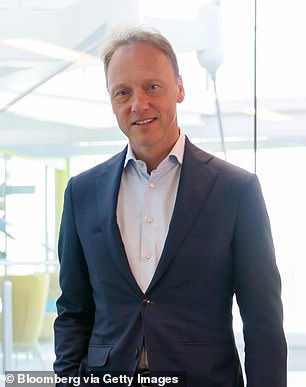
Strategy shift: Hein Schumacher
Unilever has watered down its targets on plastic packaging, workers’ pay and diversity amid investor backlash against ‘woke’ policies.
In a major strategy shift, the consumer group’s boss Hein Schumacher said he needs to ‘drive performance’ as he rowed back on sustainability pledges.
The £95billion giant, which owns brands including Dove and Hellmann’s, has pushed the idea that businesses should do good in the world.
But the Anglo-Dutch firm has drawn fierce criticism from shareholders for prioritising a ‘woke’ agenda over profits.
Unilever’s stock has underperformed rivals such as Nestle and Proctor and Gamble in recent years.
The firm, which also owns Domestos, Comfort and Knorr, yesterday axed a commitment to halve its use of new plastic by next year. Instead, Unilever – one of the biggest users of plastic packaging in the world – has promised to reduce its use of virgin plastic by a third by 2026.
It has also watered down a pledge to ensure all workers in its supply chain are paid fairly.
In 2021 the company said it would refuse to do business with firms that did not offer a living wage by at least 2030.
But just 50 per cent of Unilever’s procurement spend must be with suppliers that have signed the ‘living wage promise’ by 2026.
And it has dropped pledges to halve food waste in its operations by next year and make sure 5 per cent of the workforce will be made up of disabled workers by 2025.
Other abandoned promises include spending £1.7billion a year with diverse businesses globally by 2025.
Most of the policies were introduced under Schumacher’s predecessors Alan Jope and Paul Polman.
‘I think that was a time in which they had to imagine a world in which big ambitions were possible,’ Schumacher told Bloomberg. ‘And that was probably right at the time, but I have to now bring it back to something that I feel we can all really deliver on. I need to drive performance in the company.’
Christ Beckett, head of equity research at Quilter Cheviot, said the decision ‘reflects a pragmatic shift towards more attainable short-term goals’.



